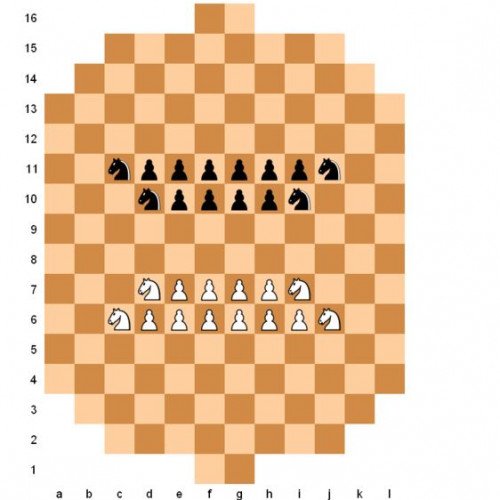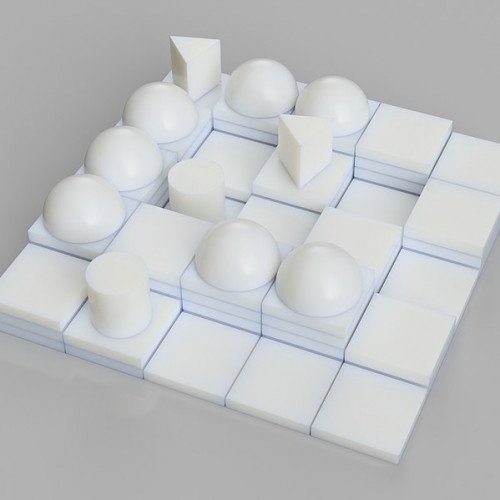CAMELOT VS SANTORINI

CAMELOT
Camelot is a strategy board game for two players. It was invented by George S. Parker late in the 19th century, and was one of the first games published by Parker Brothers, originally under the name Chivalry. The game was reissued as "Camelot" in 1930, with reduced size and number of pieces. It flourished through numerous editions and variants, achieving its greatest popularity in the 1930s, and remained in print through the late 1960s. Parker Brothers briefly republished the game in the 1980s under the name Inside Moves. Since then it has been out of print, but retains a core of fans anticipating another revival. Camelot is easy to learn and without extensive theory or praxis, making it perhaps more accessible for novices to play/enjoy compared to chess. Gameplay is exceptionally tactical almost from the first move, so games are quick to play to a finish. A World Camelot Federation exists, with free membership, led by Michael W. Nolan. Camelot was featured in Abstract Games magazine in 2001 and 2002. In 1882, George S. Parker began working on an abstract board game called Chivalry. His goal was to create a game not so difficult as chess, but considerably more varied than checkers. Parker created a game that was a complex, tactical, but an easily learned and quickly played mixture of Halma and checkers. When finally published by Geo. S. Parker & Co. in 1887, Chivalry won the raves of chess and checkers experts, but the game Parker called "the best game in 2000 years" did not catch on quickly with the general public. However, Parker never lost his enthusiasm for the game, and in 1930 he made a few changes, and Parker Brothers republished it under the name "Camelot". A few more rules changes followed in 1931. Camelot enjoyed its greatest popularity in the 1930s. Camelot players included José Raúl Capablanca, World Chess Champion from 1921 to 1927, and Frank Marshall, U.S. Chess Champion from 1907 to 1936. Sidney Lenz and Milton Work, two world-famous bridge players, also played the game. There were over 50 different editions of Camelot sets issued, including a gold-stamped leather edition and a mahogany cabinet edition. There were tournament editions, regular editions, and low-cost editions. Camelot was eventually discontinued in 1968, then reissued as "Inside Moves" in 1985, and finally discontinued again in 1986.
Statistics for this Xoptio

SANTORINI
Santorini is an abstract strategy board game for 2-4 players designed and released in 2004 by Gordon Hamilton and republished via Kickstarter in 2016 by Roxley Games. Inspired by the architecture of cliffside villages on Santorini Island in Greece, and primarily designed for two players, the game is played on a grid where each turn players build a town by placing building pieces up to three levels high. To win the game, players must move one of their two characters to the third level of the town. Each turn of play involves moving one of your two pieces around a 5-by-5 grid each turn and then placing a tile adjacent to the moved piece, building up that spot of the board. On subsequent turns, pieces may be moved onto one of these built-up tiles, but only one level up at a time. Pieces may also be moved down any number of levels. Players may also place a special dome tile on top of a three-level building, which prevents a player from moving onto that spot for the remainder of the game. The primary winning condition is to get one of your pieces onto the third level, though players may also win if their opponent is unable to make a move. The Roxley Games version of Santorini introduced a god powers variant, which gives each player a unique way to break the rules. After being directly released and sold by Hamilton in 2004, Roxley Games ran a Kickstarter campaign during March-April 2016, drawing over 7,100 backers and raising over C$700,000, the most successful Kickstarter campaign ever based in Alberta. While the original release used plain white blocks as components, the Roxley version featured an enhanced cartoon-like look to the game, which Hamilton credits for success of the Kickstarter campaign. The game was released in retail outlets in January 2017.